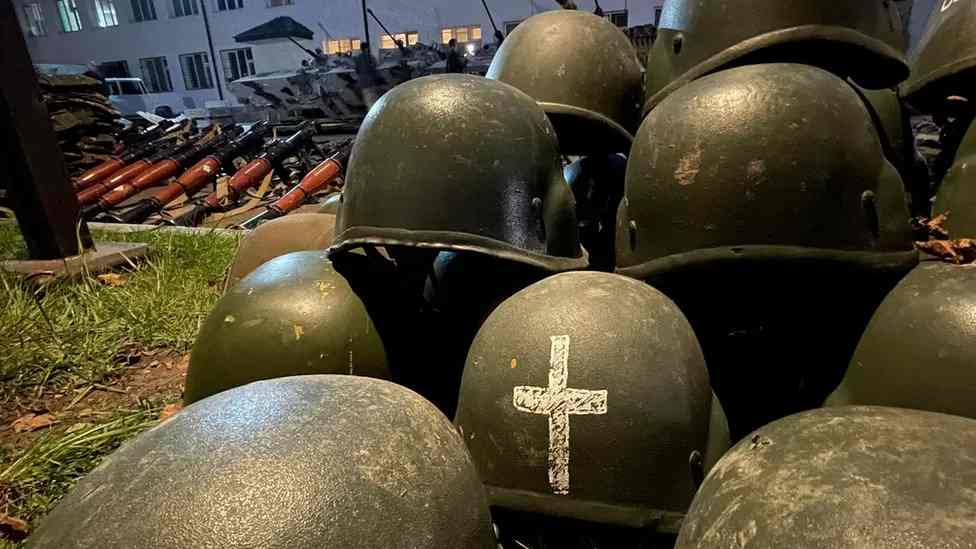Karabakh humanitarian fears grow with thousands sleeping on Stepanakert streets
24 September, 2023

Azerbaijan's military has paraded heavy weapons captured in Nagorno-Karabakh, amid warnings thousands of civilians are without shelter after the surrender of Armenian separatists.
Tanks, guns and RPGs were among the haul shown to the BBC, in the first access given to journalists since separatists agreed to disarm this week.
Ethnic Armenian leaders say thousands are without food or shelter.
Only one aid delivery of 70 tonnes of food has been allowed through.
The convoy from the International Red Cross was the first to reach the disputed territory since Azerbaijan captured it in a lightning operation five days ago. Russia says it has also delivered aid, but it is not known how much.
Nagorno-Karabakh - a mountainous region in the South Caucasus - is recognised internationally as part of Azerbaijan but large areas of it have been controlled by ethnic Armenians for three decades. On Saturday, Armenia urged the UN to send a mission to monitor the rights of ethnic Armenians in Nagorno-Karabakh, arguing that their very existence was now under threat.
Azerbaijan denies the accusation, saying it wants to reintegrate the region's ethnic Armenian residents as equal citizens of the country.
At least 200 ethnic Armenians died, including 10 civilians, as Azerbaijan's army swept into the enclave earlier this week.
Now, displaced from villages and separated from relatives, several thousand people were sleeping in tents or the open air near the airport in the main city Stepanakert, known as Khankendi by Azerbaijan, Karabakh officials said.
The airport is also near a base for Russian peacekeepers, five of whom were killed during the fighting.
On Saturday Azerbaijan said it was working with Russian peacekeepers in Nagorno-Karabakh to disarm ethnic Armenian forces - one of its key demands in return for a ceasefire.
In the courtyard of a military HQ in Susa, near the regional capital, Azeri military officials proudly laid out weapons given up by separatists.
The haul included what appeared to be a T-72 tank, several BMP-2 armoured personnel carriers, machine guns, assault rifles, body armour and mines. The BBC estimates that the area filled was equivalent to half a football field.
Russia's defence ministry said six armoured vehicles, more than 800 guns and about 5,000 units of ammunition had been handed over so far.
It is unclear what will happen to the 120,000 ethnic Armenians in Nagorno-Karabakh. Azerbaijan says it wants to reintegrate the region and an Azerbaijani official told the BBC that "no one is kicking anyone out".
"If we didn't care about civilians, women and children, we would have simply entered Khankendi," he added.
Another official said that the military had prepared camps for refugees outside of Karabakh that were "ready to accept civilians" - but there is much mistrust on both sides and many ethnic Armenians may not be willing to move.
Azerbaijan has also told the UN that it will treat Karabakh Armenians as "equal citizens". But their destiny is in Azeri hands now.
It says it envisages an amnesty for those Karabakh fighters who hand over their weapons and they can leave for Armenia if they choose.
Armenia has also set up facilities to take in thousands of civilians but Prime Minister Nikol Pashinyan has said he did not want them to leave unless they had to.
People in Stepanakert have told the BBC that many are likely to choose to leave.
"I don't know anyone who wants to stay here. I have very close elderly relatives who lost their sons in previous wars and they prefer to die here," journalist Siranush Sargsyan said.
"But for most people, for my generation, it's already their fourth war."
US Senator Gary Peters, who is leading a congressional delegation to the Armenia-Azerbaijan border, said people in Nagorno-Karabakh were "very fearful" and called for the creation of an international observer mission.
"I think the world needs to know exactly what's happening in there," he said. "We've heard from the Azerbaijani government that there's nothing to see, nothing to worry about, but if that's the case then we should allow international observers in to see."
Areas where the BBC was allowed to visit appeared empty of civilians. Only police, soldiers and a few construction workers could be seen.
There were no smiles from Russian peacekeepers that the BBC saw, and the mood was serious. But so far, there has been no major violence since the surrender.
Source: www.bbc.com
TAG(s):
